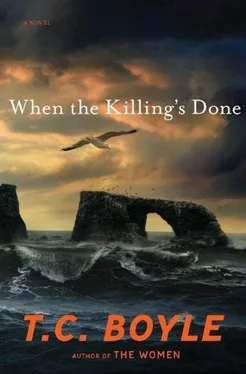The Mister — Bax, that is, the man whose late-life challenge it was to oversee these 6,800 acres on an inequitable profit-sharing basis with the owners and in whose bed she’d been sleeping since two weeks after her installation as cook, hence her status as Missus — was laid up. He’d been clearing debris out of the cratered road that angled precipitously up out of the valley on the far side of the wash, trying to preserve access to their makeshift airstrip, when the Jeep, which wasn’t much more than animated debris to begin with, flipped on him. He was thrown clear. The Jeep rolled and kept on rolling, the windshield flattened, the steering wheel sheared off and the front wheels, fenders and hood permanently rearranged, till a boulder stopped it halfway down the side of the cliff. No one had any idea what had happened till the dark began to come down and Anise, looking up from her history homework, asked, “Where’s Bax?”
He’d been lucky, or so he told it. The concussion was mild enough so he was able to keep the ravens off him, waving an arm when they got too close; it was his bad leg — the left one — that was broken; and he’d only cracked three of the twelve ribs a human being is graced with. “Forget all that Adam’s rib nonsense,” he’d told Anise that first night at the hospital in Ventura when she sat over his bed with her long worrying face on, “because men and women have exactly the same number. And that’s a common misconception, that men have one less. You know what a common misconception is? Like a prejudice. An old wives’ tale.”
But he was laid up now, feeling his hurt, frustrated, angry, sixty years old a week ago and showing it. And he was a bear in the morning anyway. So she took the pot from the stove, poured a cup heavy with sugar and cream, and handed it to Francisco. “Yeah,” she said, “that’d be great. You take it up to him. And don’t tell him anything. Or no: you tell him I’m going to be out there with those ewes till every one of them has dropped. All day, all week, and next week too, if that’s what it takes.”
Francisco — his face was remarkably smooth for a man who’d spent his whole life under the sun, which was one reason why it was so hard to estimate his age, that and the fact that he carried himself like a far younger man, back straight, his stride long and his step vigorous — gave her a nod of accord. He said one word only—“ Suerte ”—and then he took the cup and ambled out the door and up the stairs to the room above where Bax lay flat out on his back reading through the pile of old Life magazines she’d picked up at a yard sale last time they were on the coast. There’d be a chamber pot to empty. And within the hour, after he’d had his first two cups of coffee, he’d want breakfast. Before that, though, there was a stew to prepare and set on the stove to slow-cook through the day, lunch and dinner both. That and the bread rising in the six pans arrayed on the counter behind her, which would go into the brick oven once the fire she’d banked there had burned down to coals.
She went to the drawer and took out her whetstone and put an edge on the butcher knife, all the while listening to the sounds of the house, the distant bleating of the ewes and the harsh avian cursing of the ravens that had gathered in their legions for the feast she meant to deny them. Where they came from, she couldn’t say — it was a mystery. There was always a resident population hanging round the slaughtering shed or the midden out back, but as soon as lambing season began they must have quintupled their numbers, flying in from the other islands or maybe even the coast. Francisco said they were the souls of the Indians, las almas de los indios , come back from the dead to plague the white men who’d displaced them, and maybe he was right. Certainly they were as smart as any Indian or anybody else for that matter. Step outside with a rifle and they’d vanish, only to reappear just out of range. Try it with a stick, even one you’d painted black for just that purpose, and they’d ignore you. She’d seen them work in pairs, one distracting the ewe while the other went for the lamb. And while scientists might make the claim that apes are the only tool-using animals aside from Homo sapiens , she’d seen ravens drop mussels on the rocks to crack them open or pick up a stone and hold it between their claws for ballast in a heavy wind. Souls of the Indians, devils, whatever they were: they weren’t going to get at her lambs, not this year.
It was lamb at the chopping block though, one of last year’s wethers fresh-slaughtered the night before, and if someone had tapped her on the shoulder and asked her if she saw any irony in that, she would have said no, just practicality — they were in the business of shipping wool and lamb on the hoof to the coast and sustaining themselves on what they could, and that was lamb and more lamb, just as Bax had warned her that gray socked-in day they’d sat in the diner in Oxnard and become acquainted for the first time. Sheepmen ate lamb and mutton because it was there and because they couldn’t run out to Carl’s Jr. for a burger when they felt like it or cruise up the avenue for a beer and a hot dog. If the diet was a crime of sameness, she’d learned to supplement it with the occasional hog one of the hands shot or the lobster and abalone she and Anise would dive for with mask and snorkel and two pairs of cracked blue rubber flippers, just for the change. The lobsters were a treat, as many as twenty or more of them set to boil in water she’d laced with salt, peppercorns, apple cider vinegar and bay leaves, but the hands — Mexicans, mostly in their forties and fifties — were suspicious of anything new. They ignored the drawn butter and lemon wedges she’d husbanded since her last grocery run, preferring to fold up the supple white tails in their tortillas, with a scoop of beans and rice and hot sauce out of the bottle.
She used her cleaver and the butcher knife to cut chops from the loin and separate the saddle to set aside for roasting, then to strip the meat from the bone and chunk down the rest, marveling at how far she’d come in her mastery of the details. When she was living in Oxnard after Toby weaseled out on her, she could barely slice an onion her knives were so dull — and before that, when they were on the road, waitresses brought them knives, the serrated kind, to cut their steaks or chops or prime rib, and where the knives came from and who put the edge to them was no concern of hers. But not now. Now she was an intimate of knives, her knives, and she had a knife for every purpose, sticking, skinning, boning, breaking, keeping them as sharp as when they’d come out of the box at the hardware store in a time when high-quality carbon steel was manufactured right here in this country.
She dredged the meat in flour, then browned it in lamb fat while she roasted green peppers and serranos in the oven and diced tomatoes, rutabagas, celery and onions with quick brisk efficient strokes, barely noticing Francisco creep back into the room to clear the breakfast dishes from the table and slide them into the washtub. Next, she dropped the vegetables in atop the meat, setting the roasted peppers and serranos aside to cool. Then it was half a gallon of Carlo Rossi red and enough water from the tap to fill the pot (yes, they had running water now, though they’d gone without for the first year and more, a gas pump bringing it up out of the well and into a reservoir on the rise behind the house, where gravity fed it through the pipes Bax had installed at her insistence, along with a water heater so they could experience the civilizing influence of a hot shower). She gave the whole business a few brisk turns with the stirring spoon, rapped it hard against the lip of the pot and set it down on the stove, and the silence she’d come to love and expect seeped back into the room.
Читать дальше












